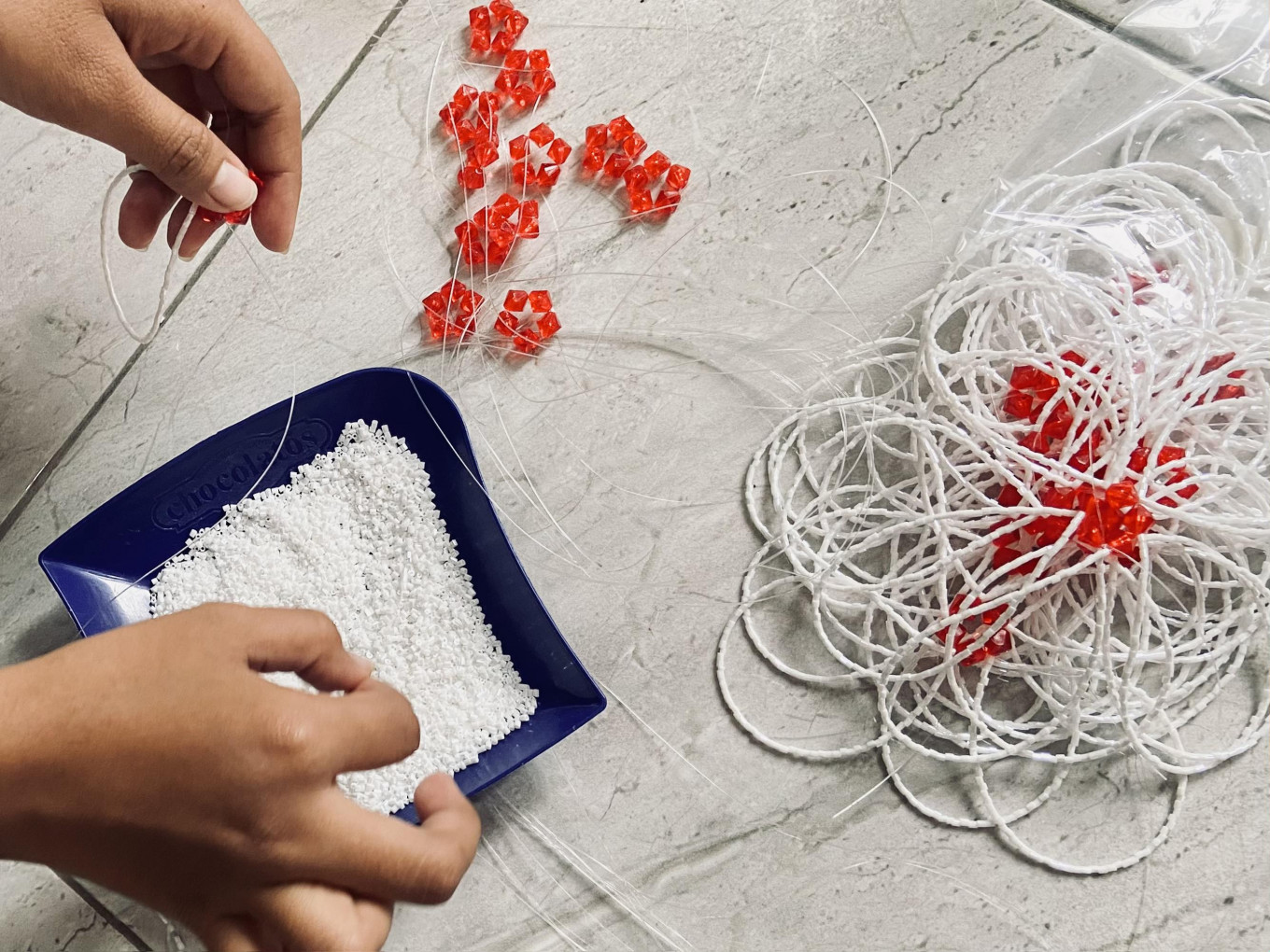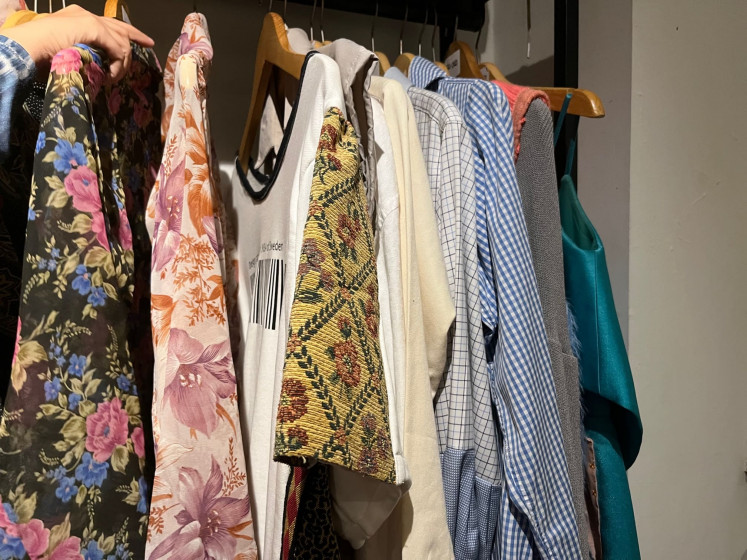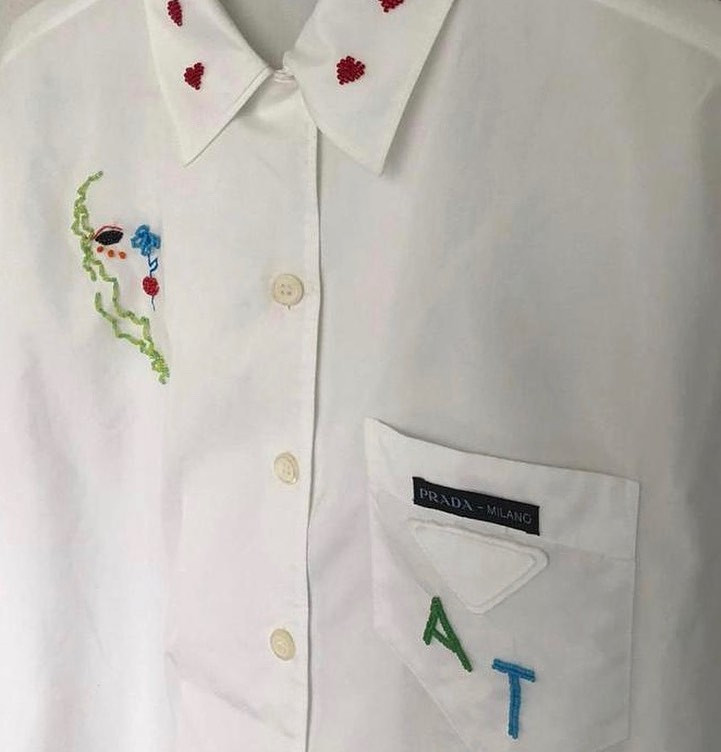Popular Reads
Top Results
Can't find what you're looking for?
View all search resultsPopular Reads
Top Results
Can't find what you're looking for?
View all search resultsWhy upcycling services are essential for sustainable fashion
As consumerism grows, reparation and alteration become options to decrease fashion waste.
Change text size
Gift Premium Articles
to Anyone
Jennifer Liviana, a fashion enthusiast based in Jakarta, gave an outdated garment a new lease on life by embellishing it with beads.
"Lately, I've been wondering how many garments we will waste if we keep buying clothes. If we can use the available resources to repair or remodify our clothes, it may be another approach to reduce fashion waste," the 28-year-old said.
As much as we enjoy looking pristine, the fashion industry is also one of the most wasteful. Pointing out the problem, Rethread cofounder Galuh Niwisaka Adikara and her business partner, Astrid Nadia, who preferred to be called Nadia, set out to find a solution by launching a Jakarta-based apparel label that offers upcycling services.
During the pandemic of 2020, Galuh enjoyed dabbling in mending and adjustments as a hobby. Upon seeing the finished products, several of her pals noticed the time and effort she put into her passion. At a later date, she and Nadia kept the business going.
Ayu Ananto, 29, and Natasha Adrianto, 30, the founders of a 5-year-old Jakarta clothing company called Mote-Mote, also shared a similar experience.
Fighting boredom during the pandemic, they agreed raising awareness about recycling and upcycling in the nation was challenging, especially at the outset of their particular expertise. Many individuals still need to be made aware of the impact caused by fashion waste on the environment.
"A lot of people didn't get the point of our services when we first began, and that was tough," Ayu said in a video interview.
Upcycling: It is possible to bestow an additional nine months to the life of a clothing item through upcycling (JP/Yohana Belinda) (JP/Yohana Belinda)A sustainable fashion plan can include upcycling, recycling and clothing swaps. Clothes can be used for longer if they are repaired or altered. Further savings of 20-30 percent in carbon and water footprints can be realized by keeping clothes for an additional nine months.
Recently, many entrepreneurs have begun offering assistance in extending the life of a garment as people's awareness grows about the waste produced by the fashion industry.
According to an article in The Business of Fashion, there is a growing market for reparation and alteration services, eventually decreasing the amount of clothing sent to landfills. Investors have been pouring millions of dollars into this pursuit. Sojo, an app supported by Depop that introduces customers to neighborhood tailors, secured US$2.4 million in pre-seed funding in April of 2022.
In addition, Uniqlo is one of many large companies that offer repairs in its flagship stores in New York, the United States, and London.
Better option
What is the big deal, anyway? The reason for this shift is Generation Z is notoriously wasteful. As a result, fashion publications like Vogue and NSS reported second-hand shopping has become more like fast fashion. According to NSS, 40 percent of all donated clothing worldwide is in poor condition and cannot be worn.
There are two methods for mending: the obvious and the stealthy. When Nadia and Galuh do visible repairing, they add a decorative piece of needlework to the garment. When they do invisible mending, they reweave the yarn into the garment fabric or upholstery to create a nearly invisible patch. To do this, they need to collect warp and weft threads from the hem or another similar piece of fabric and use them to recreate the original cloth's warp and weft.
When asked about her thoughts on sustainable fashion, Galuh remarked fixing clothes was a more-accessible and straightforward alternative to achieve sustainable fashion because an individual already owned the piece.
Although thrifting "may be another means of decreasing fashion waste", it "might potentially lead to increased fashion consumption" if people carry on buying it, "although you genuinely don't need the clothing", as Nadia put it.
Detail: Individuals can also add their personal details to the clothing component through the upcycling process, which gives the item an additional edge. (Courtesy of Mote Mote) (Archive/Courtesy of Mote Mote)Therefore, with the help of a clothing-repair business, the item owner can keep it around for a lot longer and enjoy the memories it contains. According to Nadia and Galuh, most customers bring apparel either passed down from their grandparents or meaningful clothes as it reminds them of a significant life event (such as a wedding or a birthday).
"It's interesting to watch people who are really in love with a certain item. One of our customers sent us an heirloom garment to be mended," Galuh said.
Moreover, access to additional mending and modifying services around the country allows fashionistas like Jennifer to level up their looks and express their individuality even more.
"From a more conceptual standpoint, they are exciting; one of the brands I've been watching for some time now has been fusing antique shirts into one piece, and I think that's cool," Jenifer said.
Growing business
In addition, the reparations and customizations of existing products are experiencing rapid expansion across the nation.
Both Ayu and Natasha reported their sales had been going up. They would like to express their gratitude to the growing number of customers aware of the environmental issues due to the waste in the fashion industry.
Natasha revealed most of their clients at the pandemic's beginning had been primarily personal; however, now they can work with other clothing brands in Indonesia, such as Callie Cotton, 3Mongkis and a collective called Lazy Susan.
"Now it varies; most recently, we worked together on a product based on pre-owned clothing," Natasha said, adding their business was not limited to upcycling clothing pieces but also shoes or leather goods.
They further shared modifying a piece for a customer could take anywhere from one week to one month, depending on the design's difficulty and placement. Natasha and Ayu have several collections for their clients, including zodiacs (from which clients can select a pattern depicting their astrological sign), earth day and three-dimensional flowers.
Challenge
Despite increasing awareness, mending or altering clothing in Indonesia has always been difficult. Galuh claimed a high level of expertise was required to ensure the seamstress would not destroy the outfit. Learning new techniques for sewing various clothing is an integral part of the expertise. Additionally, some still think obtaining sustainable fashion is costly.
Moreover, Ayu remarked, many garments were more challenging to upcycle than others. PVCs and other similarly durable materials are difficult to sew, while low-quality cotton is easily damaged. Ayu and Natasha hope in the future, people will be more conscientious about the fabrics they wear.
"Another thing individuals can do to prolong their garment is [pay attention to] the choice of fabric and how you wash your clothes," Ayu said.
Although upcycling clothing services are now available and slowly getting the industry's approval, consumers must still be vigilant.
"Nonetheless, it's important to exercise caution when shopping; ask yourself questions such as, 'Are the clothes made of fine quality, to last for a long time?'" Nadia said.
"'Are these clothes made with a suitable material to be repaired?' This question indicates more work is required to establish a 'circular trend,'" she continued.
However, raising awareness is more challenging because Indonesia is widely recognized as one of the world's largest markets for fast fashion.
Databoks reported the Indonesian smartphone survey platform JakPat found 80 percent of respondents preferred free-delivery options. And to entice customers, e-commerce companies frequently run sales with discounts ranging from 10-70 percent, complemented by free delivery and other perks.
An overwhelming majority of buyers (82 percent) favored free shipping above discounts (76 percent), according to the research published in the journal titled “Analisis Perilaku Konsumerisme Masyarakat Pada Diskon Belanja Online Pengguna E-commerce Shopee” (roughly, Analysis of Community Consumerism Behavior of Shopee E-commerce Users on Discounted Products) by Shinta Nur Haliza and Muhammad Alhada Fuadilah Habib.
Intan Anggita Pratiwi elaborated by saying being a more mindful person generally took time and effort. Trying out different looks often results in more clothing purchases. Yet, mastery requires effort and time.
The 36-year-old mother of one went on to say for Indonesia to achieve a greener fashion cycle, everything could be improved by setting a good example. She made the statement in the internet age, conveying a more environmentally friendly and sustainable fashion industry via social media and her South Jakarta listening bar, SUBO. She also stresses nobody should be forced to learn about eco-friendly lifestyles.
"By having others see what I'm wearing, or our employees here [at SUBO] wearing an upcycled apron, it helps others to get more curious," she said.
"So, everyone needs a process; once they know more about themselves, they'll slowly learn how to be more sustainable," Intan closed.













